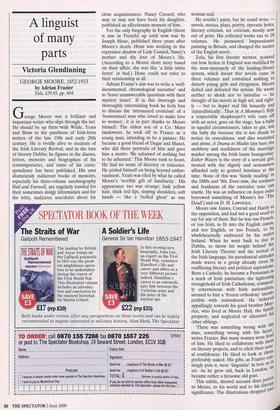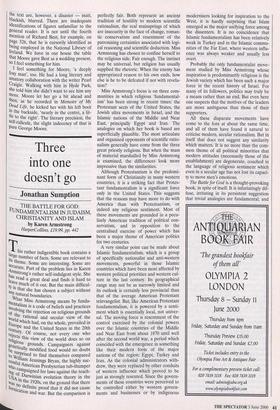A linguist of many parts
Victoria Glendinning
GEORGE MOORE, 1852-1933 by Adrian Frazier Yale, £29.95, pp. 604 George Moore was a brilliant and important writer who slips through the net. He should be up there with Wilde, Yeats and Shaw in the pantheon of Irish-born writers of the late 19th and early 20th century. He is vividly alive to students of the Irish Literary Revival, and in the lore of literary Dublin; he figures in the diaries, letters, memoirs and biographies of his contemporaries, and some of his corre- spondence has been published. His own shamelessly indiscreet books of memoirs, especially his three-volume autobiography Hail and Farewell, are regularly trawled for their sometimes dodgy information and for the witty, malicious anecdotes about his close acquaintances. Nancy Cunard, who may or may nor have been his daughter, published an affectionate memoir of him.
Yet the only biography in English (there is one in French) up until now was by Joseph Hone, published three years after Moore's death. Hone was working in the repressive shadow of Lady Cunard, Nancy's mother and the love of Moore's life. (According to a Moore short story based on their affair, she was like 'a little white ferret' in bed.) Hone could not refer to their relationship at all.
Adrian Frazier's aim was to write a 'well- documented, chronological narrative' and to 'leave unanswerable questions with their mystery intact'. If in this thorough and thoroughly entertaining book he feels free to discuss the 'attenuated eroticism' of a `homosexual man who loved to make love to women', it is in part thanks to Moore himself. The eldest son of a Co. Mayo landowner, he took off to France as a young man, intending to be a painter. He became a good friend of Degas and Manet, who did three portraits of him and gave him a motto: 'Be ashamed of nothing but to be ashamed.' This Moore took to heart. He had no sense of decency or reticence. He prided himself on being beyond embar- rassment. Yeats was riled by what he called Moore's 'terrible gift of familiarity'. His appearance too was strange: lank yellow hair, thick red lips, sloping shoulders, soft hands — like a 'boiled ghost' as one woman said.
He couldn't paint, but he could write — novels, stories, plays, poetry, operatic lyrics, literary criticism, art criticism, mostly now out of print. His collected works ran to 20 volumes. He pioneered Impressionist painting in Britain, and changed the nature of the English novel. Zola, his first literary mentor, pointed out how fiction in England was stultified by the near-monopoly of the lending-library system, which meant that novels came in three volumes and contained nothing to disturb young girls and clergymen. Moore defied and defeated the system. He wrote neither to shock nor to moralise — he thought of his novels as high art, and right- ly — but to depict real life honestly and `naturalistically'. Thus in A Mummer's Wife a respectable shopkeeper's wife runs of with an actor, goes on the stage, has a baby in squalid circumstances, takes to gin, lets the baby die because she is too drunk to notice its convulsions, and dies wretched and alone. A Drama in Muslin lays bare the snobbery and sordidness of the marriage market among the Irish haute bourgeoisie. Esther Waters is the story of a servant girl, treated with the dignity and seriousness afforded only to genteel heroines at the time. None of this was 'family reading' In the 1880s and '90s. Even now, the coolness and frankness of the narrative tone can startle. He was an influence on Joyce (w11° borrowed something of Moore's for 'The Dead') and on D. H. Lawrence. Moore saw James, Conrad and Hardy as the opposition, and had not a good word to say for any of them. But he was too French, or too Irish, to fit into the English canon, and too English, or too French, to be wholeheartedly embraced by his native Ireland. When he went back to live 10 Dublin, to throw his weight behind the Irish Literary Theatre and the revival of the Irish language, his paradoxical attitudes made. waves in a group already riven by conflicting literary and political aspirations. Born a Catholic, he became a Protestant as a mark of Irish patriotism: the tightening stranglehold of Irish Catholicism, common- ly coterminous with Irish nationalis01, seemed to him a 'frozen orthodoxy' incom patible with nationhood. He behave ° appallingly towards his good brother 1\40,11' rice, who lived at Moore Hall, the fainq property, and neglected or alienated his other siblings. `There was something wrong with 111e, man, something wrong with his heart% writes Frazier. But many women were fond of him. He liked to collaborate with theta on literary projects, and to elicit their Sall al confidences. He liked to look at the preferably naked. His gifts, as Frazier can ningly puts it, were 'linguistic' in love as,! art, As he grew old, back in London, II"' became rather a tiresome old goat. „ This subtle, shrewd account does lilst17, to Moore, to his world and to his literary significance. The illustrations dropped 1-11 the text are, however, a disaster — matt, blackish, blurred. There are inadequate identifications of figures unfamiliar to the general reader. It is not until the fourth mention of Richard Best, for example, on page 326, that he is cursorily identified as being employed in the National Library of Ireland. We have in our house the table that Moore gave Best as a wedding present, so I feel something for him. I feel something for Moore, 'a deeply foxy man', too. He had a long literary and amatory collaboration with the writer Pearl Craigie. Walking with him in Hyde Park, she told him she didn't want to see him any more. Moore let her go a bit ahead and then, as he recorded in Memoirs of My Dead Life, he kicked her with his left boot in the backside, 'nearly in the centre, a lit- tle to the right'. The literary precision, the self-ridicule, the slight indecency of that is pure George Moore.






































































 Previous page
Previous page